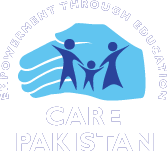Pakistan faces a serious education emergency. 21% of school-aged children in Pakistan do not receive an education, a right guaranteed in the country’s constitution, while 57% of class 5 children cannot read sentences or do two‐digit division. Over half of all women in Pakistan are illiterate; in rural areas this increases to two-thirds of women. Funding for schools decreased 40% from 2.5% of GDP in 2005 to 1.5% just six years later, less than the annual subsidy given to the national airline.
We know that education holds the power to help people escape poverty, even in the face of adversity. In Pakistan the wages of a literate person are 23% higher than those of an illiterate person. Working women with good literacy skills earned 95% more than women with weak literacy skills. Education allows women to have a greater influence on family size. If Pakistan were to halve inequality in access to education, it would increase its economic growth by 1.7%.
CARE Pakistan’s vision is a country where all children have access to high quality education that unlocks their full potential and helps them realise their aspirations.
“EDUCATION IS THE GIFT THAT NO FLOOD CAN TAKE AWAY.”
Seema Aziz, Chairperson
In over 25 years, CARE has established itself as Pakistan’s largest education foundation.
Lack of funds and inefficient disbursement has created an environment where regional authorities now welcome CARE to adopt their underfunded and failing Government schools. This allows CARE to save on huge land and construction costs and channel much higher proportions of funding directly to the students and teachers.
Because our model is scalable (there’s an enormous supply of failing schools across Pakistan available for adoption), CARE can educate as many children as it can receive funding for and become increasingly sustainable as CARE grows it’s endowment fund.
CARE students go on to perform on the same level as the country’s elite private schools, and graduate to become doctors, engineers, accountants and much more. CARE student Rabia Ashiq represented her country in the 2012 Olympics in London! Much of this is possible because CARE’s approach to education is a truly holistic one, supporting students with extra initiatives including Access to English programmes, career counselling, enterprise development, a dedicated scholarship fund and much more, which endows our students with the skills and confidence required to compete on a truly global platform upon leaving school.
Our mission is to put 1 million children into the classroom by 2018. Our 1 million goal is a single benchmark that will set the stage for more to come.


 Care Pakistan Football Tournament 2022 -
Care Pakistan Football Tournament 2022 - 